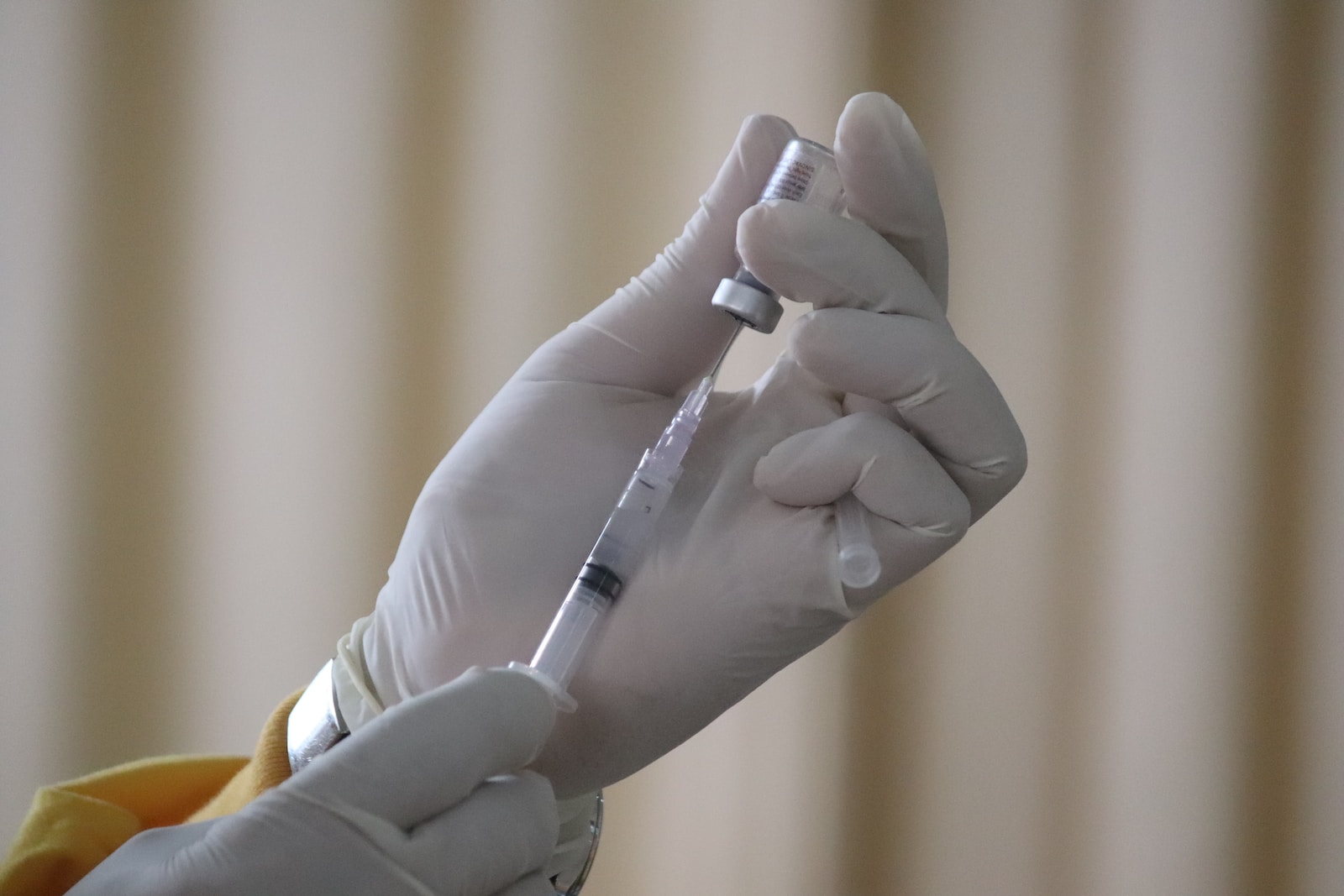Dog vaccines are an essential part of keeping your furry friend healthy and safe from harmful diseases. Vaccines work by stimulating the immune system to recognize and fight off specific viruses and bacteria. By doing so, they help prevent the spread of infectious diseases that can be fatal to dogs.
As a responsible pet owner, it’s important to understand the different types of vaccines available and when they should be administered. Core vaccines are considered essential for all dogs and protect against diseases such as parvovirus, distemper, rabies, and adenovirus. Non-core vaccines, on the other hand, are optional and may be recommended based on your dog’s lifestyle and risk factors.
It’s important to work closely with your veterinarian to develop a vaccination schedule that’s tailored to your dog’s individual needs. Your vet can provide guidance on which vaccines are necessary and when they should be administered. By staying up-to-date on your dog’s vaccinations, you can help ensure that they stay healthy and happy for years to come.
Core Vaccines
Core vaccines are an essential part of a dog’s health regimen. They are vaccines that are recommended for all dogs, regardless of their lifestyle or geographic location. These vaccines protect against diseases that are highly contagious and potentially fatal.
Parvovirus
One of the most important core vaccines for dogs is the Parvovirus vaccine. Parvovirus is a highly contagious virus that attacks the dog’s intestines and can cause severe vomiting, diarrhea, and dehydration. It can be fatal, especially in puppies who have weaker immune systems. The vaccine is given as a combination vaccine, commonly referred to as DA2PP, DHPP, or DAPP, which also protects against other core diseases.
Rabies
Rabies is a viral disease that affects the nervous system of mammals, including dogs. It is transmitted through the saliva of an infected animal, usually through a bite. Rabies is a fatal disease that can also be transmitted to humans. All dogs are required to have a rabies vaccine by law in most states. The vaccine is highly effective, and it is recommended that dogs receive a booster shot every three years.
Core vaccines also protect against other illnesses, such as Canine Distemper, Hepatitis, and Adenovirus. Canine Distemper is a viral disease that attacks a dog’s respiratory, gastrointestinal, and nervous systems. Hepatitis is a viral disease that affects a dog’s liver, and Adenovirus is a virus that can cause respiratory infections.
Leptospirosis is another disease that can be prevented with a vaccine. It is a bacterial infection that can be transmitted through the urine of infected animals, including rats, raccoons, and skunks. Dogs that are exposed to areas with standing water or wildlife are at higher risk of contracting Leptospirosis.
In conclusion, core vaccines are essential for the health and well-being of dogs. They protect against highly contagious and potentially fatal diseases and are recommended for all dogs, regardless of their lifestyle or geographic location. It is important to keep your dog up-to-date on their vaccinations to ensure their continued health and happiness.
Noncore Vaccines
Apart from core vaccines, there are noncore vaccines that are recommended for some dogs based on their lifestyle, geographic location, and risk of exposure. These vaccines are not mandatory but can provide additional protection against certain diseases.
Canine Influenza
Canine influenza is a highly contagious respiratory disease that affects dogs of all ages and breeds. The virus can spread quickly in places where dogs congregate, such as kennels, dog parks, and grooming facilities. The H3N2 and H3N8 strains of the virus are the most common in the US. Dogs that are frequently exposed to other dogs, such as those who attend dog shows or participate in agility competitions, may benefit from the canine influenza vaccine.
Bordetella Bronchiseptica
Bordetella bronchiseptica is a bacterium that can cause kennel cough, a respiratory infection that is highly contagious among dogs. The vaccine is recommended for dogs that are frequently exposed to other dogs, such as those who stay in kennels or attend dog shows. The vaccine is available in different forms, including an injectable vaccine and a nasal spray.
Other noncore vaccines include:
- Borrelia burgdorferi (Lyme) vaccine: This vaccine is recommended for dogs that live in areas where Lyme disease is prevalent or for those that frequently travel to such areas. The vaccine can help protect against the bacterium that causes Lyme disease, which is transmitted by ticks.
In conclusion, noncore vaccines can provide additional protection for dogs based on their lifestyle and risk of exposure. Dog owners should consult with their veterinarian to determine which vaccines are appropriate for their pet.
Puppies
When it comes to puppies, preventive care is essential to keep them healthy and happy. One of the most important aspects of preventive care is ensuring that they receive the necessary vaccinations. Puppies are particularly vulnerable to diseases, so it’s crucial to start their vaccination schedule as soon as possible.
DAP
One of the most common vaccines that puppies receive is the DAP vaccine. This vaccine protects against several diseases, including distemper, adenovirus (hepatitis), and parvovirus. These diseases can be deadly, especially in young puppies, so it’s important to make sure they receive this vaccine.
The DAP vaccine is usually given in a series of shots, starting when the puppy is around 6-8 weeks old and continuing every 2-4 weeks until they are around 16 weeks old. The exact schedule may vary depending on the veterinarian’s recommendations and the puppy’s individual needs.
It’s important to note that even after the initial series of DAP shots, puppies will need booster shots to maintain their immunity. The frequency of booster shots will vary depending on the specific vaccine and the puppy’s individual needs.
When taking a puppy to a vaccination clinic for their DAP shots, it’s important to schedule an appointment in advance. This will help ensure that the puppy receives the necessary shots and that the veterinarian has time to answer any questions or concerns.
In addition to receiving the necessary vaccinations, puppies should also receive regular veterinary care to ensure that they are growing and developing properly. This includes regular check-ups, deworming, and parasite prevention. By providing puppies with the necessary preventive care, owners can help ensure that their furry friends have a happy and healthy life.
Adult Dogs
When it comes to adult dogs, it is important to understand that they still need to receive vaccinations to keep them healthy. Vaccinations are a crucial part of preventive care, and they can help protect your dog from a variety of diseases and illnesses.
Common vaccinations for adult dogs include the core vaccines, which are the DAP and rabies vaccines. These vaccines are important because they protect against diseases like canine distemper, canine parvovirus, and rabies. Noncore vaccines may also be recommended by your veterinarian, depending on your dog’s lifestyle and risk factors.
It is important to note that vaccinations can cause some side effects, such as fever, vomiting, diarrhea, and lethargy. These side effects are usually mild and go away on their own, but in rare cases, they can lead to more serious complications like liver or kidney failure. If your dog experiences any of these side effects after receiving a vaccine, it is important to contact your veterinarian right away.
To ensure that your dog receives the proper vaccinations, it is recommended that you schedule an appointment with a veterinary care provider or vaccination clinic. During this appointment, your veterinarian will assess your dog’s health and recommend the appropriate vaccines based on their age, lifestyle, and risk factors.
In conclusion, adult dogs still require vaccinations as part of their preventive care. By staying up-to-date on your dog’s vaccinations, you can help protect them from a variety of diseases and illnesses. Remember to monitor your dog for any side effects after receiving a vaccine and contact your veterinarian if you have any concerns.
Kennels and Dog Parks
When it comes to kennels and dog parks, it is important to ensure that your dog is up-to-date with all the necessary vaccines. Many kennels and dog daycares require proof of vaccinations before allowing your dog to stay with them. Similarly, dog parks can be a hotbed for diseases and infections, so it is important to vaccinate your dog to protect them from potential exposure.
One of the most common vaccines required for kennels and dog parks is the Bordetella vaccine, which protects against kennel cough. Kennel cough is a highly contagious respiratory disease that can spread quickly in places where dogs congregate, such as kennels, dog parks, and dog daycares. The Bordetella vaccine is usually given annually or more frequently if there is a high risk of exposure.
Another important vaccine for kennels and dog parks is the DHPP vaccine, which protects against distemper, adenovirus, parainfluenza, and parvovirus. These diseases can be spread through contact with infected dogs or their bodily fluids, and can lead to serious health complications if left untreated. The DHPP vaccine is usually given as a series of shots during puppyhood and then as a booster every one to three years.
In addition to vaccines, it is important to take other precautions when visiting kennels and dog parks. Always supervise your dog and keep them on a leash to prevent them from getting into fights or biting other dogs. If your dog does get into a fight or suffers a bite wound, seek veterinary care immediately to prevent infections and other complications.
Overall, vaccinating your dog is an important step in protecting their health and well-being, especially when visiting kennels and dog parks. By keeping your dog up-to-date with their vaccinations and taking other precautions, you can help ensure that they stay healthy and happy.
Common Diseases
When it comes to keeping your dog healthy, vaccinations are a crucial part of their overall care. Vaccines help protect against a variety of diseases, some of which can be life-threatening. Here are a few of the most common diseases that dogs can be vaccinated against:
Canine Parainfluenza Virus
Canine parainfluenza virus is a highly contagious respiratory disease that can cause coughing, runny nose, and fever. It is often spread through contact with infected dogs, such as at dog parks or kennels. Puppies are particularly vulnerable to this disease, which can be severe and lead to pneumonia. The vaccine for canine parainfluenza virus is often given in combination with other vaccines, such as for distemper and adenovirus.
Lyme Disease
Lyme disease is caused by the Borrelia burgdorferi bacteria, which is transmitted to dogs through the bite of an infected tick. Symptoms of Lyme disease can include fever, joint pain, and lethargy. If left untreated, it can lead to more serious health problems, such as kidney disease. The vaccine for Lyme disease is often recommended for dogs that live in areas with a high prevalence of ticks.
Other common diseases that dogs can be vaccinated against include rabies, distemper, and adenovirus. Rabies is a serious disease that is fatal if left untreated, and it can also be transmitted to humans. Distemper is a highly contagious viral disease that can cause a range of symptoms, from mild respiratory issues to severe neurological problems. Adenovirus is a virus that can cause respiratory disease, hepatitis, and other health problems.
It’s important to note that vaccines are not 100% effective, and some dogs may still contract these diseases even after being vaccinated. However, getting your dog vaccinated is still the best way to protect them from these serious health threats.
In addition to getting your dog vaccinated, there are other steps you can take to help keep them healthy. This includes regular check-ups with your veterinarian, keeping your dog up-to-date on flea and tick preventatives, and practicing good hygiene, such as washing your hands after handling your dog.
Overall, by taking a proactive approach to your dog’s health, you can help ensure that they live a long, happy, and healthy life.
Dog Vaccines are the key your dogs health
Vaccinations are an essential part of pet healthcare. They help stimulate the immune system and promote the production of antibodies, which protect dogs from various diseases. It is important to follow the vaccination schedule recommended by your veterinarian to ensure your dog is protected from the most common and dangerous diseases.
The core vaccines that should be administered to every dog include Parvovirus, Distemper, Rabies, and Adenovirus. Other vaccines, such as those for Lyme disease, Bordetella bronchiseptica, and canine influenza, may be recommended depending on your dog’s lifestyle and risk factors.
It is important to note that vaccines may have side effects, but they are generally mild and short-lived. Serious reactions are rare, but if you notice any unusual symptoms after your dog has been vaccinated, you should contact your veterinarian immediately.
In addition to vaccinations, it is important to maintain good hygiene practices and keep your dog away from other dogs that may be sick. Regular check-ups with your veterinarian can also help identify any potential health issues early on.
Lastly, it is important to be aware of the privacy policy of any website or service that you use to schedule or receive vaccinations for your dog. Make sure that your personal information is protected and that you are comfortable with the level of data sharing that is required.
Top Flea and Tick Prevention Products for Your Dog: Breaking the Itch
Dog Health: A Comprehensive Guide to Common Issues, Preventative Care, and Treatment Options
What Dog Vaccines To Give






